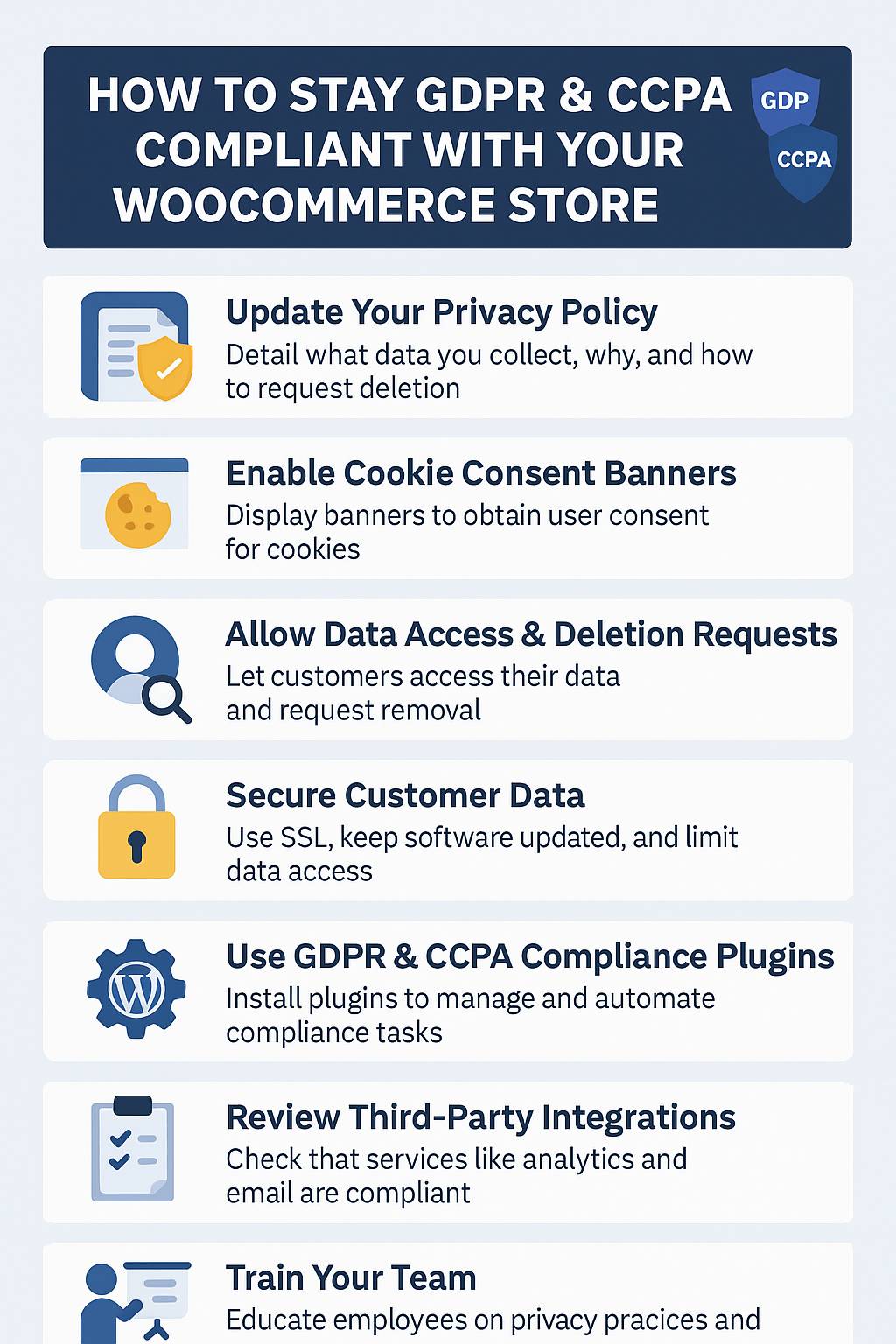How to Stay GDPR & CCPA Compliant with Your WooCommerce Store
If you run a WooCommerce store, you don’t just sell products—you also collect, process, and store customer data. With global privacy laws like the General Data Protection Regulation (GDPR) in Europe and the California Consumer Privacy Act (CCPA) in the US, compliance in 2025 is non-negotiable.
Failing to comply can mean hefty fines and a loss of customer trust. This guide explains what GDPR and CCPA mean for WooCommerce store owners and how to stay compliant.

📘 What Is GDPR?
GDPR applies to businesses that collect or process data from EU citizens.
It gives customers rights over their data, such as:
The right to access their personal information
The right to delete their data (“Right to be forgotten”)
The right to know how their data is used
📘 What Is CCPA?
CCPA protects California residents and gives them:
The right to know what personal data is collected
The right to opt out of data sales
The right to delete personal data
Even if your business isn’t based in California or the EU, if you sell globally, these rules likely apply to you.
🛒 How GDPR & CCPA Affect WooCommerce Stores
WooCommerce stores collect:
Names, emails, phone numbers
Billing/shipping addresses
Payment information
Browsing data (cookies, analytics)
This makes compliance critical.
🔐 Steps to Make Your WooCommerce Store GDPR & CCPA Compliant
1. Update Your Privacy Policy
Clearly explain:
What data you collect
Why you collect it
How customers can request deletion
2. Enable Cookie Consent Banners
Use plugins like CookieYes or Complianz to display cookie banners.
Give users the option to accept/reject tracking cookies.
3. Allow Data Access & Deletion Requests
WooCommerce provides tools to:
Export customer data
Erase personal data upon request
4. Secure Customer Data
Use SSL certificates (HTTPS)
Keep WordPress, WooCommerce, and plugins updated
Limit access to customer data with user role management
5. Use GDPR & CCPA Compliance Plugins
Recommended plugins:
GDPR Cookie Consent
Complianz GDPR/CCPA
WP Legal Pages
These automate cookie notices, privacy policy pages, and consent logs.
6. Review Third-Party Integrations
If you use tools like Google Analytics, Mailchimp, or Facebook Pixel, ensure they are configured in a GDPR/CCPA-compliant way (with consent and opt-out options).
7. Train Your Team
Make sure your team knows how to handle:
Customer data requests
Secure handling of sensitive information
Compliance procedures
✅ Compliance Checklist for WooCommerce (2025)
Privacy Policy page updated
Cookie consent banner active
Data export & erase requests enabled
Secure SSL certificate
GDPR/CCPA plugin installed
Third-party tools configured for compliance
Conclusion
Creating a WordPress plugin using Node.js opens up new possibilities for developers who prefer JavaScript over PHP. By leveraging the power of Node.js, you can build high-performance plugins that enhance WordPress functionality.
📘 Related Blogs
🙋 Need Help With WooCommerce Compliance?
I help store owners set up GDPR & CCPA compliance tools so they can focus on sales while staying legally safe.
